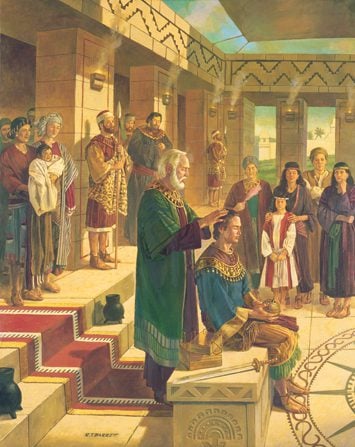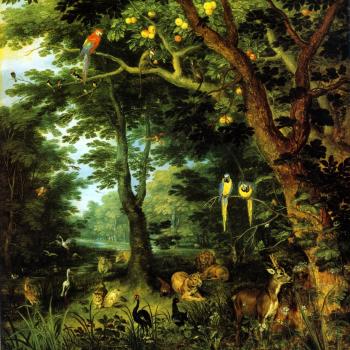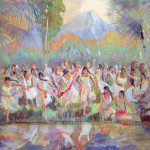
(Robert T. Barrett, LDS.org)
This entry draws upon John W. Welch, et al., eds. Knowing Why: 137 Evidences That the Book of Mormon Is True (American Fork: Covenant Communications, 2017), 192-194:
King Benjamin’s speech in the first portion of the book of Mosiah represents one of the high points of the entire Book of Mormon, and is a very fine and important piece of religious oratory or writing. “A stunning array of literary structures appears in Benjamin’s speech, purposefully and skillfully organized,” John W. Welch has observed. “Benjamin’s use of chiasmus, all types of parallelisms, and many other forms of repeating patterns adds focus and emphasis to the main messages and the persuasive qualities of this text” (192).
Here, for example, is the chiasm that appears in Mosiah 5:10-12:
And now it shall come to pass,
(A) that whosoever shall not take upon him the name of Christ
(B) must be called by some other name;
(C) therefore, he findeth himself on the left hand of God.
(D) And I would that ye should remember also,
that this is the name that I said I should give unto you
(E) that never should be blotted out,
(F) except it be through transgression;
(F’) therefore, take heed that ye do not transgress,
(E’) that the name be not blotted out of your hearts.
(D’) I say unto you, I would that ye should remember
to retain the name written always in your hearts,
(C’) that ye are not found on the left hand of God,
(B’) but that ye hear and know the voice by which ye shall be called,
(A’) and also, the name by which he shall call you.
Amazingly, the entirety of King Benjamin’s speech, which occupies almost the whole of Mosiah 2-5, was probably dictated within about 1.5 days. Which suggests that the time required to dictate the mere three verses of Mosiah 5:10-12 must have been very brief indeed.
What is the significance of chiasmus in the Book of Mormon? It’s not, of course, that chiasmus is somehow intrinsically divine or, in itself, direct proof of revelation. But chiasmus is a common element in several ancient literatures and something of which Joseph Smith was almost certainly unaware. As such, it is suggestive of the genuine antiquity of the Book of Mormon
Further analysis of the literary qualities of Mosiah 2-5 can be found in several places, including:
John W. Welch, “Parallelism and Chiasmus in Benjamin’s Speech,” in King Benjamin’s Speech: “That Ye May Learn Wisdom,”, John W. Welch and Stephen D. Ricks, eds. (Provo, UT: FARMS, 1998), 315–410.
John W. Welch, “Benjamin’s Speech: A Masterful Oration,” in King Benjamin’s Speech: “That Ye May Learn Wisdom,” John W. Welch and Stephen D. Ricks, eds. (Provo, UT: FARMS, 1998), 55-88.
John W. Welch, “What Does Chiasmus in the Book of Mormon Prove?” in Book of Mormon Authorship Revisited: The Evidence for Ancient Origins, Noel B. Reynolds, ed. (Provo, UT: FARMS, 1997), 199–224.
John W. Welch, “Chiasmus in the Book of Mormon,” in Chiasmus in Antiquity: Structures, Analyses, and Exegesis, ed. John W. Welch, ed. (Hildesheim: Gerstenberg Verlag, 1981; reprinted Provo, UT: Research Press, 1999), 198–210.












